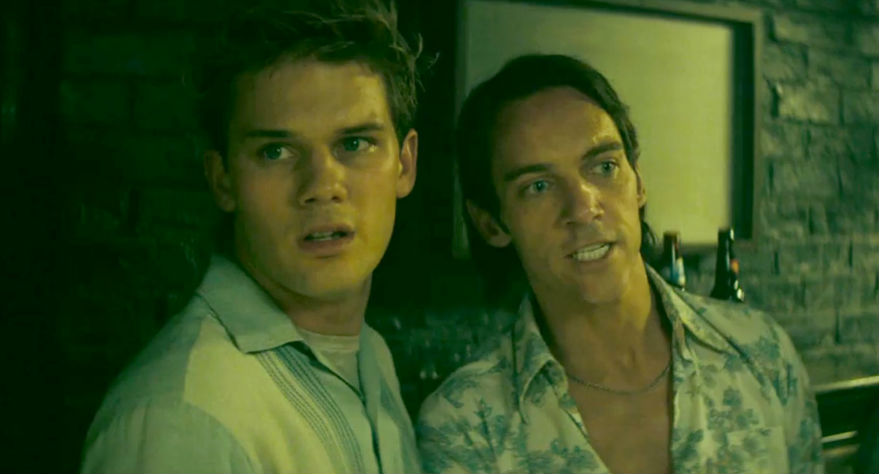
This scatterbrained tribute to the most defining moment in gay activism history misses the point entirely.

This scatterbrained tribute to the most defining moment in gay activism history misses the point entirely.
Stonewall, an uncomfortably inaccurate historical drama directed by Roland Emmerich, is such a confused, misguided, scatterbrained movie that it’s hard to decide where to begin in assessing its shortcomings (it comes up short on almost every front). It’s about the immensely important June 1968 Stonewall Inn riots, the single greatest breakthrough in gay activism—but really, it isn’t. Emmerich sullies and smudges that moment in history so crudely (and ironically) with Hollywood stereotypes, clichés, and ham-fisted filmmaking that it’s crystal clear, without a doubt, that he’s missed the point entirely.
One of the defining characteristics of the riots was that it was led in large part by people of color. Some of these key figures are represented in the movie, like Marsha P. Johnson (Otoja Abit), founder of Street Transvestite Action Revolutionaries, but they’re relegated to minor (offensively minor) roles. Tragically, at the center of Emmerich and screenwriter Jon Robin Baitz’s rendition of the story is a fictional, white, Midwestern man named Danny, played by English actor Jeremy Irvine. It’s a choice that lacquers the film with a thick coating of inauthenticity. We follow Danny as he plays proxy for ignorant white audiences, running away from his small Indiana town after being outed and yelled at by his homophobic, football-coach dad. Danny heads straight for New York City’s gay community epicenter, Christopher Street, where he’s taken in by a group of wild street kids.
Jonny Beauchamp plays Ray, a born leader and firestarter and Danny’s primary liaison. Vying for Danny’s affection is a quietly charming, manipulative gay rights activist played by Jonathan Rhys Meyers, whose 3rd-floor apartment overlooks the street kids’ stoop and the Stonewall Inn. The supporting players are universally bland, their actors (mostly talented) underserved. Caleb Landry Jones has been carving out quite a fascinating career on the independent scene in recent years, but his turn here as a trans stereotype in no way helps his career along.
The film flashes back occasionally to Indiana and Danny’s falling-out with his family, which is as generic a coming-out story you’ll ever hear (though Danny’s accepting little sister, played by Joey King, offers some genuine sweetness). Other than the dark cloud of the homophobic, abusive NYPD hanging over the movie, there’s the imposing presence of Ron Perlman’s Ed Murphy, a dangerous quasi-pimp of pretty boys like Danny. Oh, and Danny’s attending night school at Columbia while he waits anxiously for his parents to send in papers to secure the scholarship he’s worked so hard for.
Emmerich seems totally disoriented as he zips from plot thread to plot thread, never sure about which one to concentrate on. Nothing takes priority and the greatest loss as a result of his confusion is that the riots themselves, which lasted for days in real life, only last for one night and don’t get much focus at all. It’s a big miss on Emmerich’s part and it left an awful taste in my mouth. Perhaps the most disgusting moment comes when Danny, the “white savior” himself, starts the riot with a corny, ADR battle cry of “Gay POWER!” and a brick through a window. Emmerich has said he included the character of Danny because he had to tell the story of Stonewall from his (white) perspective, which is troubling in itself, but this slow-motion moment of heroism makes his statement even uglier.
Speaking of ugly, the movie looks atrocious. Emmerich and cinematographer Markus Förderer seem to be going for a vintage, newsreel feel, but the aesthetic is ruined with environments and interiors that reek of artificiality. The sets are too pristinely lit, the costumes look like they came from a high school theater classroom, the shots are unremarkable—Stonewall looks like a bargain-bin musical adaptation, not a tribute to a gay activism triumph.
The movie was, according to Emmerich, made for straight, white people, a sort of crash course in the history and nature of the gay rights movement. It’s obvious, after watching this thing, that he’s made a big mistake; instead of sending blaring, dim-witted messages to white America like an ignoramus over-enunciating to a deaf child, maybe he should have just told the true story. Then, maybe people might have listened.